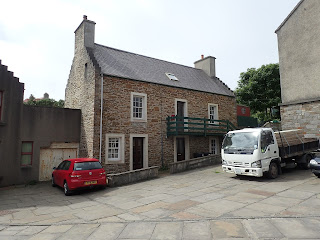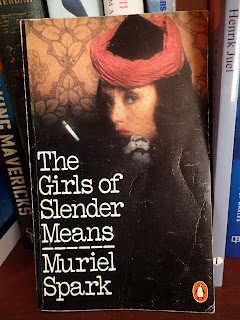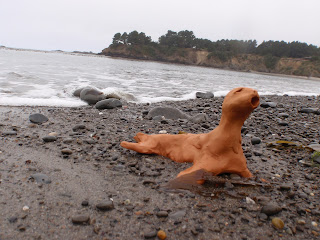Showing posts with label Scotland. Show all posts
Showing posts with label Scotland. Show all posts
Friday, May 11, 2018
Monday, April 2, 2018
Catch-and-Release
Odd sensory memories surfacing from 2016
while I was working through a stack or two of paperwork:
a rat so very gingerly swimming past my kayak in the canals of Venice;
a bat so very gently rebounding from my chest in a castle in Scotland.
Thursday, January 18, 2018
Wistful about Orkney Diving
I'm missing Scotland and wishing that I'd been in good enough shape to dive the Scapa Flow in Orkney last summer. I was there, but the commuting combined with old sports injuries had really done a number on my back and leg. The long plane ride and the car-hopping across Scotland didn't help either.
(Still in pain, in process.)
Now, Northern California diving is world-class and wonderfully kelpy, but I'm feeling the pull of a missed opportunity, you know?
An Orkney view.
(Still in pain, in process.)
Now, Northern California diving is world-class and wonderfully kelpy, but I'm feeling the pull of a missed opportunity, you know?
An Orkney view.
Labels:
Memories,
Orkney,
Regrets,
Scapa Flow,
Scotland,
Scuba diving
Saturday, December 2, 2017
Monday, August 7, 2017
Sunday, July 9, 2017
Wednesday, July 5, 2017
Tuesday, July 4, 2017
Stromness Shots
That's a two-way street, by the way.
Motorists are very accommodating of each other in Orkney in particular and in Scotland in general.
Looking out from, more than at:
Stromness,
Orkney.
Orkney Kine
Orkney kine are not the hairy, furry Scottish cattle that one expects. They are multicolored, or of various colors, not the ruddy shade you may expect. And, cattle and sheep alike lie down (lay down--what's that rule?) to avoid the worst of the wind in ways that I am not used to with livestock. I mean, some sheep and cattle flatten themselves like cats or dogs in the sun.
Friday, October 28, 2016
Tuesday, September 13, 2016
McIlvanney: "The Language of My Living"
Here's a passage from one of William McIlvanney's novels that I've always liked. The juxtaposition of humility and arrogance, the mix of what others think versus what the narrator knows, has stuck with me, has resonated over the years. I recall giving this passage to a colleague, for I felt that the passage conveyed both his affect and his self-understanding, but he just smiled as he read, so I wasn't given a full commentary. I relate and don't quite relate to what's voiced here, but it always resonates.
Here, read for yourself:
'Well,' she said. 'I'd better be going.'
I looked at her and nodded. She smiled and pointed to the ground behind the cars. There were tread-marks on the grass.
'Those,' she said. 'They'll always remind me of Scott. Him and me here. I wonder how long they'll last. What is all this about for you really? I mean. What is it you're doing exactly?'
'I don't know exactly. I suppose I'm trying to make my own peace with Scott's death. I suppose this is how I do it.'
'How do I do it?'
She started suddenly to cry.
'Damn,' she said. 'Will you hold me one time for him?'
I crossed and held her. It was a small, chaste ceremony of mutual loss. Her hair in my face gave off a melancholy sweetness. Clenched to her, I felt the tremors of her body, how the edifice of beauty was undermined from within with deep forebodings. In the embrace I experienced our shared nature--so much questionable confidence containing so much undeniable panic. That was me, too. Some of my colleagues and bosses liked to say I was completely arrogant. They misunderstood the language of my living. Arrogance should be comparative. Humility was total. Faced with simplistic responses to life that tried to fit my living into themselves, I was arrogant. I seemed to meet them every day and I knew I was more than they said I was. But when I sat down inside myself in the darkness of a night, I knew nothing but my smallness. I knew it now and shared it with hers.
--William McIlvanney,
Strange Loyalties,
A Harvest Book,
Harcourt Brace and Company,
1991
This is the third Laidlaw book, and the other two are worth looking for. This one shifts the narration from third-person to first-person (and for excellent reasons).
Here, read for yourself:
'Well,' she said. 'I'd better be going.'
I looked at her and nodded. She smiled and pointed to the ground behind the cars. There were tread-marks on the grass.
'Those,' she said. 'They'll always remind me of Scott. Him and me here. I wonder how long they'll last. What is all this about for you really? I mean. What is it you're doing exactly?'
'I don't know exactly. I suppose I'm trying to make my own peace with Scott's death. I suppose this is how I do it.'
'How do I do it?'
She started suddenly to cry.
'Damn,' she said. 'Will you hold me one time for him?'
I crossed and held her. It was a small, chaste ceremony of mutual loss. Her hair in my face gave off a melancholy sweetness. Clenched to her, I felt the tremors of her body, how the edifice of beauty was undermined from within with deep forebodings. In the embrace I experienced our shared nature--so much questionable confidence containing so much undeniable panic. That was me, too. Some of my colleagues and bosses liked to say I was completely arrogant. They misunderstood the language of my living. Arrogance should be comparative. Humility was total. Faced with simplistic responses to life that tried to fit my living into themselves, I was arrogant. I seemed to meet them every day and I knew I was more than they said I was. But when I sat down inside myself in the darkness of a night, I knew nothing but my smallness. I knew it now and shared it with hers.
--William McIlvanney,
Strange Loyalties,
A Harvest Book,
Harcourt Brace and Company,
1991
This is the third Laidlaw book, and the other two are worth looking for. This one shifts the narration from third-person to first-person (and for excellent reasons).
Labels:
Arrogance,
Crime novels,
Good Living,
Grief,
Hubris,
Humility,
Laidlaw,
Language,
Life,
Literature,
Loss,
Loyalty,
McIlvanney,
Perception,
Scotland
Tuesday, July 19, 2016
Edinburgh Light
Edinburgh was a bit of a puzzle for me, and it still is in terms of balancing or juggling what I like and don’t like about the city. Edinburgh is a city and a wonderfully compact one, as anyone will tell you, and that’s appealing in the same way that San Francisco is so much more appealing than LA, say. Or, perhaps, Seattle may be a better comparison, nowadays. I’m not sure.
When I first saw Edinburgh, I was looking through a doubled pair of lens, Boswell’s and Ian Rankin’s, seeing both the 18th-century and Rebus’ cities intertwined. And a third strand when I looked at the Castle and saw the winding streets and closes near the Castle was Dunnett’s strand, the Lymond of Crawford strand, for that one wasn’t as apparent as I had first hoped. I had to look for the 16th and 17th century elements. And, while I knew the Castle was on a volcanic outcropping and loomed over the New Town, say, I wasn’t quite prepared for the layering, the labyrinthian qualities, the sheer complex design and lack of design of a city that had grown over time on such an uneven surface. I could understand Edinburgh metaphorically, suddenly, and that made both Dunnett and Rankin clearer to me. A canny place.
I wanted to like Edinburgh, but I didn’t like the city at first. Rain coming down didn’t help; anxiety about getting from airport to city centre to Dalkeith lodgings didn’t help either. The height of the houses, of the buildings in general, surprised me and put me off. The dirty gray and yellow and black stones of the houses also looked dingy, sooty, filthy in the cold, gray light too. But then the sun flashed out through the clouds as the wind whipped about, and a brighter face shown through. The sky in its brightness seemed higher than the sky at home, as if the sky were a ceiling however highly placed, but that’s exactly how the brightness of the light translated to me, illuminating the walls and the streets, catching the wetness of the past shower with a gleam, raising that ceiling as it were for a more expansive world.
Labels:
Boswell,
Dunnett,
Durham,
Edinburgh,
Hadrian's Wall,
Light,
Rankin,
Reflections,
Scotland,
York
Saturday, July 16, 2016
Reading Fritz Leiber: Fafhrd and the Gray Mouser on the Royal Mile
Fritz Leiber and his The Swords of Lankhmar (1968) proved to be my boon companion during my recent European vacation. I'd packed a stack of books, carefully chosen, from Lord Byron to Julius Caesar to Steven Erikson for the long flights, train rides, and potential deluges, but a last-minute snatch of Leiber's novel from a stack in my study as I was headed out the door proved the best choice of all. I read around in Byron for Venice and for the Rhine, read around in Caesar for my Germans and Celts, read around in guide books and historical studies of Hadrian's Wall and such, but a slow passage by passage working through with Fafhrd, the Gray Mouser, and the diabolical rats of Lankhmar was the most satisfying of all. Leiber's wit, his sense of humor and of rascally honor, his characters and characterization, and the plotting--this one early novel of Newhon, remember--all that, each element, stirred and teased me and pleased me as never before. This is a novel I've read and enjoyed at least twenty times before, but The Swords of Lankhmar had never truly impressed me until this particular slow reading.
And the reading was slow, for I was busy traveling and sight-seeing, walking and paddling, the cobbled streets and crowded canals of a handful of European cities and towns--Venice, Munich, Bacharach, Edinburgh, York--as well as palaces and castles and pubs. All of those places fit with the images of Newhon and Lanhkmar, with Leiber's fantasy world and its mix of Hellenistic, Medieval, and Renaissance qualities in manners, clothing, and architecture. (So easy to picture the two heroes ambling down the back street of a town on the Rhine or even a Scottish close off the Royal Mile.) As a normally quite fast reader, I was reminded to slow down, to savor the sentences and phrases, to note the particular wittiness of a line or the tactical wisdom of a portion of a plot pattern. And, since rats are a particular menace in The Swords of Lankhmar, I even welcomed my one actual rat sighting in a canal of Venice, though we did have to back-paddle to make sure the little fellow didn't climb upon any of our kayaks. (He pulled himself out of the water and into a crack in some foundation.)
I also followed a hint from Ian Rankin, author of the Inspector Rebus novels, and picked up a novel by Scottish author Muriel Spark: The Girls of Slender Means (1963). A very different sort of book than Leiber's, but equally witty, equally bound by action and circumstance and character, Spark's novel is a valuable find for me. Leiber works far more broadly, of course, and with entertainment his main goal, while Spark delves more deeply, for all her light touches of manner and speech, and leaves her reader in a literary place beyond expectation; at least, she did that to me, for me. A wonderful juxtaposition, a fortuitous pairing.
Wednesday, July 13, 2016
Sunday, January 6, 2013
Macbeth Underwater
I'm trying to cut back on my book-buying, so about an hour ago I was faced with a dilemma. In my right hand, I was holding Antonia Fraser's history of the Gunpowder Plot (which I will refer to tangentially when I teach Macbeth this term); in my left hand, I was holding the Diving and Snorkeling Guide to Scotland. I also had tucked under my left elbow a book about 18th-century England that I'd already decided was necessary and inexpensive enough to buy (for another class).
In the spirit of adventure, of Macbeth Underwater, I chose the diving guide, though I'm already noticing that drysuits are preferred over wetsuits -- sure, cold cold water -- and that snorkeling or diving in Loch Ness is not recommended (too silty, too little visibility; no warnings about monsters).
(There's always later in the week for the Gunpowder Plot . . . .)
There may be some broad hints toward that book-plot I've been wrestling with . . . Macbeth Underwater . . . .
In the spirit of adventure, of Macbeth Underwater, I chose the diving guide, though I'm already noticing that drysuits are preferred over wetsuits -- sure, cold cold water -- and that snorkeling or diving in Loch Ness is not recommended (too silty, too little visibility; no warnings about monsters).
(There's always later in the week for the Gunpowder Plot . . . .)
There may be some broad hints toward that book-plot I've been wrestling with . . . Macbeth Underwater . . . .
Saturday, October 27, 2012
"The Music of the Seals"
The seals are very fond of music. Everywhere I went people told me that, but I was never fortunate enough to hear first hand the music that belongs to them. I believe there is music that remains privately in the minds of the country people of the West, but can only give here a few pieces that have found their way into print. I shall put first a ballad, "The Grey Selchie of Sule Skerrie," and, last, a few notes which were sung by a seal off the island of Skomer, Pembrokeshire, in 1946, and recorded there by Dr. Ludwig Koch. These two have moved me more than the others.
--from David Thomson's final chapter -- "The Music of the Seals" -- in his The People of the Sea: A Journey in Search of the Seal Legend.
Counterpoint Press: Washington, D.C.. 2000.
First published in 1954 by Turnstile Press Ltd, in Great Britain; revised editions in 1965 and 1980.
Counterpoint edition features an introduction by Seamus Heaney.
Subscribe to:
Posts (Atom)






























































